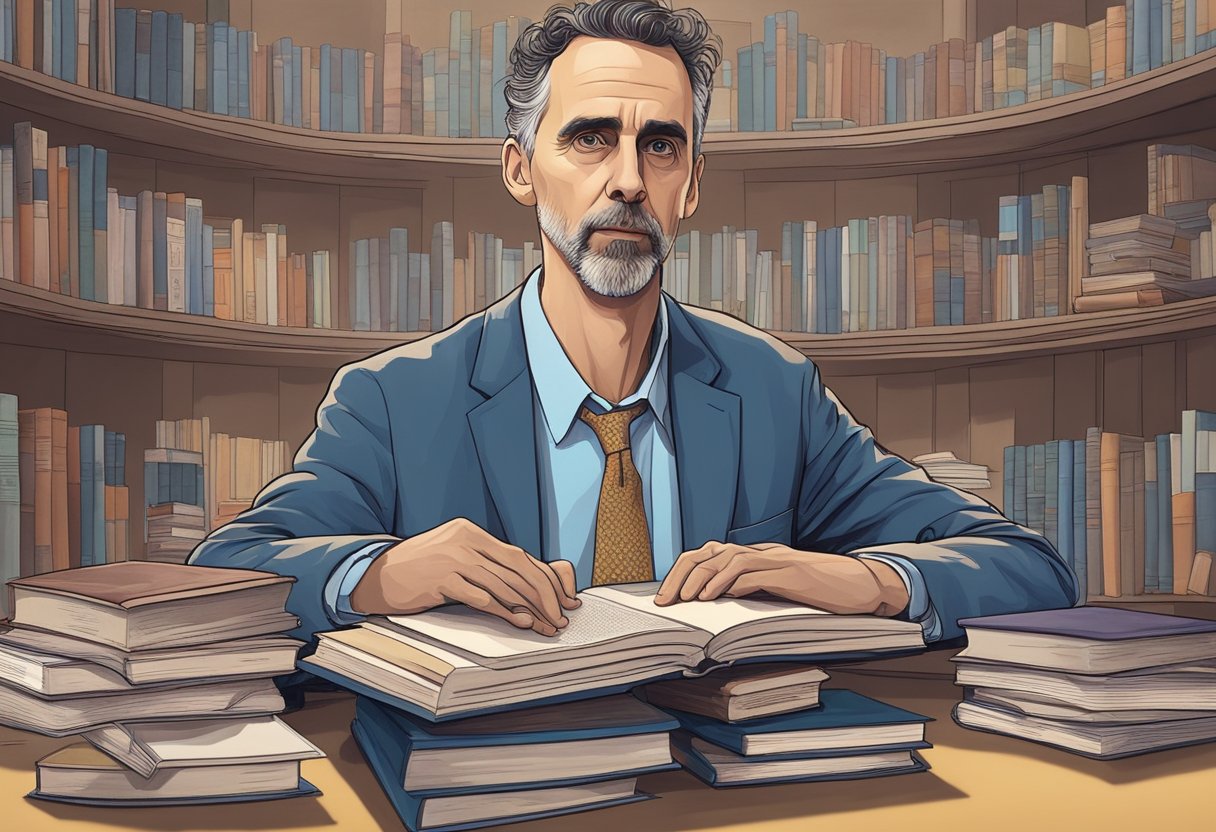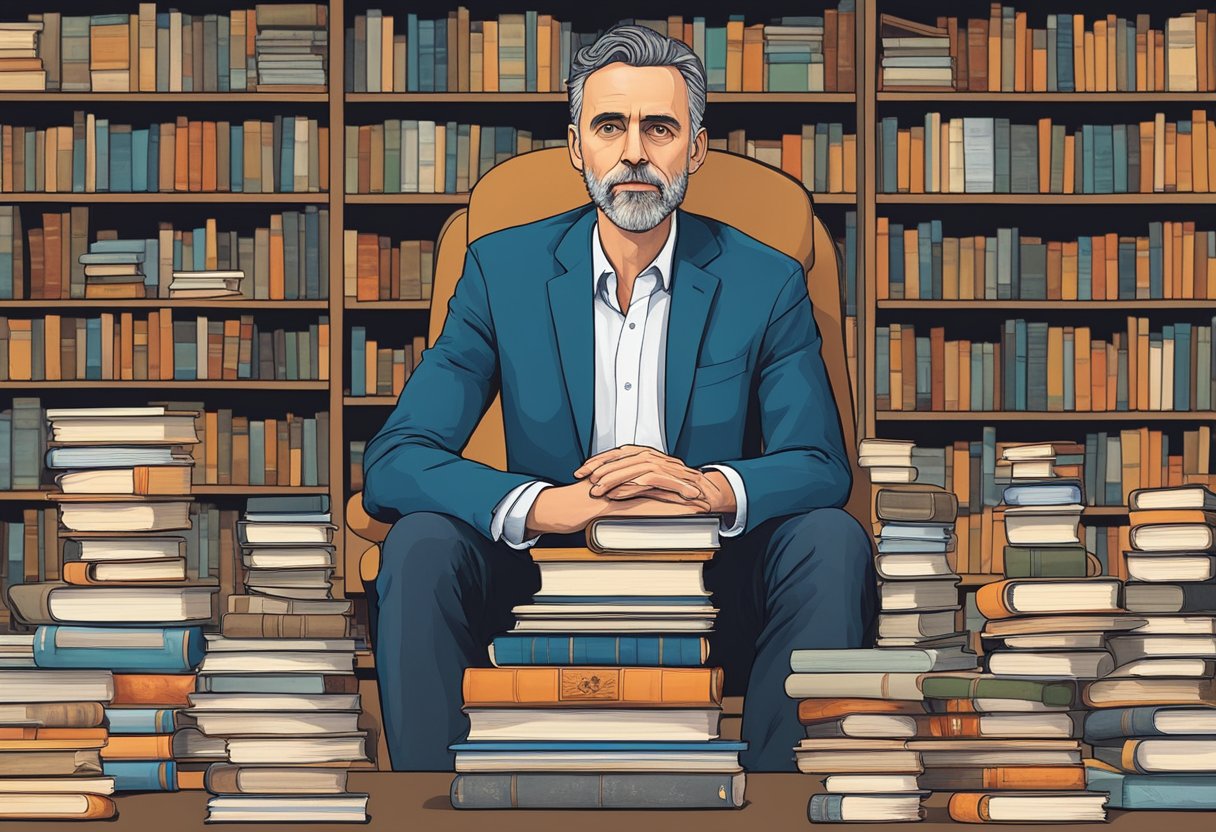Jordan Peterson's formative years cultivated a blend of intellectual rigor and rugged individualism that facilitated his subsequent rise to prominence. Born on June 12, 1962, in Edmonton, Alberta, Peterson grew up in the small town of Fairview where he began to lay the groundwork for his future pursuits. His upbringing in the northwest of Alberta was marked by the influences of his mother, Beverley, a librarian, and his father, Walter, a schoolteacher. These familial ties in a remotely situated community shaped his early perspective and approach to life.

Peterson's path to becoming a clinical psychologist and cultural critic was in part paved by his educational experiences. He attended the University of Alberta, where he completed his B.A. in political science before turning his attention to psychology. After earning his Ph.D. in clinical psychology from McGill University, Peterson's academic and clinical career progressed swiftly. He has since made his mark not only in the realm of psychology but also in the broader cultural discourse, where his thoughts on personal responsibility and the importance of archetypal narratives have resonated with many.
Key Takeaways
- Peterson's roots in a small Alberta town and the influence of his parents shaped his early development.
- His educational journey took him from the University of Alberta to McGill University, culminating in a Ph.D. in clinical psychology.
- Peterson's work has extended beyond academia to widely influence cultural discussions on personal responsibility and narrative.
Early Life and Education

Jordan Peterson's formative years were marked by a distinct interplay of northern Canadian upbringing and a profound engagement with academia, which laid a foundation for his later work as a clinical psychologist and cultural commentator.
Childhood and Family Background
Born in Edmonton, Alberta, Jordan Peterson spent much of his childhood in the small town of Fairview. He grew up in a middle-class family, with Walter Peterson as his father. Peterson's early life in the cold expanses of Canada instilled in him a strong sense of individualism and self-reliance.
Academic Journey
After attending Grande Prairie Regional College for a year, Peterson transferred to the University of Alberta, where he completed his bachelor's degrees in Political Science and psychology. This period was crucial as it coincided with the end of the Cold War, an event that influenced his scholarly interests. He pursued his doctoral studies at McGill University, where he received his PhD in clinical psychology.
Undergraduate Education:
- Grande Prairie Regional College
- University of Alberta: BA in Political Science, BA in Psychology
Graduate Education:
- McGill University: PhD in Clinical Psychology
Peterson later served as a professor at both McGill University and the University of Toronto, significantly shaping his academic and professional trajectory.
Influential Literature and Philosophers
During his academic years, Peterson delved into the works of Carl Jung and Aleksandr Solzhenitsyn, among others. The deep explorations of human nature by Jung and the profound meditations on totalitarianism by Solzhenitsyn greatly influenced Peterson's understanding of personality and politics, elements that prominently feature in his later lectures and writings.
Academic and Clinical Career

Jordan Peterson has established himself as both a clinical psychologist and an esteemed academic. His career spans various prestigious appointments and significant contributions to psychological literature.
University Appointments
Peterson served as a Professor of Psychology at the University of Toronto, where he delved into the intricacies of psychology, both teaching the subject and engaging with it at a deep level. Prior to his tenure there, he made his mark as an assistant professor at Harvard University. His roles at these institutions not only involved lecturing but also mentoring students and developing course material that bridged the gaps between psychology, mythology, and religious studies.
Clinical Practice
Parallel to his academic endeavors, Peterson practiced as a Clinical Psychologist. His clinical practice informed his research and vice versa, allowing him to draw upon a wealth of real-world experience in his academic pursuits. He has been known to approach clinical psychology not just as a science but as an opportunity to explore and ameliorate human suffering at the individual level.
Academic Research and Publications
Peterson's academic research includes a broad spectrum of interests, ranging from the structure of belief systems to the psychology of creativity and performance. His formidable portfolio of publications is a testament to his commitment to academia. His prolific contributions to psychological literature have affirmed his position as a leading researcher in his field.
Major Works and Philosophies

Jordan Peterson has made significant contributions to modern thought through his major published works, which integrate elements of psychology, philosophy, and religion to discuss the nature of meaning in human life. His seminal works, "Maps of Meaning: The Architecture of Belief" and "12 Rules for Life: An Antidote to Chaos," delve into the complexities of human beliefs and behaviors, offering insights into the chaotic nature of existence and the pursuit of meaning.
Maps of Meaning: The Architecture of Belief
"Maps of Meaning: The Architecture of Belief" is a profound exploration of the psychological systems that underpin myths and beliefs. In this work, Peterson analyses the relationships between belief, reality, and the human narrative, scrutinizing the way cultures and individuals construct meaning from the chaos of existence. By weaving theories from psychology, philosophy, and other disciplines, Peterson presents a framework for understanding the foundation of human thought and the motivation for action.
12 Rules for Life: An Antidote to Chaos
"12 Rules for Life: An Antidote to Chaos" is a distillation of practical wisdom, drawing on Peterson's diverse expertise in psychology, myth, religion, and personal anecdotes. The book provides a guide for living a more fulfilled life through a set of principles that aim to bring balance to the chaos of modern existence. Each rule offers a pathway for navigating the complexity of life, emphasizing personal responsibility and the search for personal meaning.
Public Engagement and Media Presence
Jordan Peterson has capitalized on various media platforms to amplify his messages, gaining a broad audience through engaging lectures, a strong social media presence, and high-profile interviews. His ability to interweave psychology with philosophy has resonated with many across the globe.

Lectures and Podcasts
Peterson's career as a lecturer extends beyond the traditional classroom setting. His lectures have been widely disseminated, particularly through his YouTube channel, where he tackles complex subjects such as psychology, philosophy, and personal development. This digital extension of his academic work has attracted viewers worldwide. Additionally, the Jordan B. Peterson Podcast provides another avenue for audiences to engage with his ideas in a more portable format.
Social Media Influence
A pivotal component of Peterson's public engagement stems from his effective use of social media platforms, most notably Twitter. His tweets often spark discussions and debates among followers and critics alike, generating a significant number of retweets and likes. This online activity has not only promoted his work but also solidified his influence in digital discourse.
Notable Interviews and Appearances
Among Peterson's many media appearances, his interview with Cathy Newman on Channel 4 News stands as one of the most impactful on his public profile. The exchange went viral, showcasing his debate skills and increasing his prominence as a public figure. Such high-visibility events have played a crucial role in expanding his reach and exposing his ideas to a broader audience.
Controversy and Public Debate

Jordan Peterson's rise to prominence has been marked by his stance on various political issues, his advocacy for free speech, and his vocal opposition to Canada's Bill C-16. These positions have sparked significant public debate and controversy.
Political Stance
Jordan Peterson, a Canadian psychologist, has often been associated with critiques of the New Democratic Party (NDP) and its former leader, Rachel Notley, particularly regarding policies and legislation that he views as a shift towards compelled speech. His political commentary extends beyond party lines and often addresses the broader socio-political climate in Canada.
Free Speech Advocacy
He has positioned himself as an ardent defender of free speech, engaging in numerous public debates and discussions. Peterson argues that free speech is the cornerstone of a functioning democracy and is necessary to counteract the potential overreach of government authority.
Bill C-16 Opposition
Peterson gained widespread attention for his opposition to Bill C-16, legislation that added gender identity and expression to the list of prohibited grounds of discrimination under the Canadian Human Rights Act. He expressed concerns that the bill would mandate specific language use, thereby infringing on personal liberty and free speech rights. This stance fueled rallies, counter-demonstrations, and debates covered by national media, situating Peterson at the center of a national conversation on free speech and legislation in Canada.
Influence and Impact
Jordan Peterson's ascent as a public intellectual has been marked by a substantial influence on young men and society's approach to psychology, and cultural and religious discourse. Often hailed for reviving interest in the classic virtues of respect, values, and wisdom, his views have permeated discussions surrounding success, political correctness, ideological debates, and identity politics.
Influence on Young Men
Dr. Peterson has attracted a substantial following, particularly among young men, who find his messages on personal responsibility and finding meaning in life to be transformative. He stresses the importance of setting one's house in order before criticizing the world, a principle that resonates with his audience seeking direction. This message of self-help combined with his stoic demeanor offers a counter-narrative to what he perceives as an overemphasis on rights over duties in contemporary society.
Contribution to Psychology
As a clinical psychologist and author, Peterson has contributed significantly to the field of psychology. His interpretation of personality traits, especially with respect to the Big Five personality model, and his work on the psychological significance of religious and ideological beliefs have been influential. He approaches psychological well-being through the lens of his "maps of meaning" framework, which draws from diverse sources, including Christian symbolism, to help people find a pathway through the complexities of modern life.
Cultural and Religious Commentary
Peterson's cultural commentary often intertwines with his religious viewpoints. His lectures often reference Christian theology, not merely as religious dogma but as a foundational element of Western civilization that offers existential insights into the human condition. He advocates for a return to traditional narratives found in religion and mythology as a means of grappling with life's challenges. This stance has made him both a respected figure by those who share his values and a controversial one in political and social spheres. His critiques of political correctness and ideological simplifications have sparked debates on the role of identity politics in shaping modern discourse.
Personal Philosophy and Worldview

Jordan Peterson's personal philosophy and worldview are characterized by distinct interpretations of order, chaos, and the human experience. They draw upon a range of psychological theories, religious narratives, and classical mythologies.
Order and Chaos
Peterson frequently references the concepts of order and chaos as central themes in his work. Order is regarded by him as the realm of stability, familiarity, and tradition, while chaos represents the unknown, potential, and the need for adaptation. Peterson suggests that a balanced life navigates between these two extremes, using order to provide structure and chaos as an opportunity for growth.
Religious Beliefs and Mythology
He extensively discusses religious beliefs and mythology, particularly focusing on Christian narratives and their relevance to modern life. His interpretation of biblical stories, especially those of Genesis, seek to extract psychological truths. Peterson views religious mythologies broadly as maps for navigating existence, embodying timeless truths about the human condition.
Views on Personality and Development
Peterson’s views on personality development are influenced by a blend of postmodern philosophy and psychology. He leans on the Big Five personality traits model to explore human complexity and advocates for personal responsibility and self-improvement. His critique of postmodernist thought is rooted in its tendency, as he perceives, to deny the existence of a cohesive identity or an enduring human nature.
Health and Personal Challenges

Jordan Peterson has faced significant health challenges, including depression and anxiety. These issues have intersected with his life as a public intellectual, which has elicited a strong public response and outpouring of support.
Personal Health Issues
Jordan Peterson has publicly battled with depression, an issue he shared with a sense of respect for the difficulties such conditions entail. His struggles have included a dependency on benzodiazepines, a class of medications commonly prescribed for anxiety. This reliance led to a complicated withdrawal process, which was exacerbated by his wife's cancer diagnosis, adding to the strain on his mental health.
Public Response and Support
As a well-known public intellectual, Peterson's transparency regarding his personal health has resonated with many. He has received an immense amount of respect and support from the public, with many finding inspiration in his vulnerability and his philosophical approach to life's hardships. Messages of encouragement flooded in from across the globe as his fans wished for his recovery and applauded his courage in discussing such personal matters.
Legacy and Continuing Influence
Jordan Peterson's impact on both educational spheres and public discourse continues to resonate strongly today. His scholarly contributions and personal philosophy have sparked ongoing discussions, with both his supporters and detractors actively engaging with his ideas.
Educational Contributions
At the University of Toronto, Jordan Peterson has had a significant influence as a professor. Maps of Meaning, one of his seminal works, is not just a book but also a course he has taught, which delves into the structure of belief systems and their role in regulating emotions. His academic work there has left an indelible mark on students and has been integral in shaping the curriculum. He has also authored the bestselling book, 12 Rules for Life, which extends his insights beyond academia and seeks to provide a practical framework for personal development. These works underscore his commitment to education and intellectual exploration.
Ongoing Discussions and Projects
Peterson's voice has not only influenced his followers through his academic endeavors but continues to do so via various projects and speaking engagements. He engages in discussions concerning psychological well-being, societal structures, and personal responsibility. Notably, his lectures and debates are widely circulated on the internet, sparking intellectual conversations and controversies alike. His commitment to ongoing discourse exemplifies his belief in the importance of conversation in personal and societal evolution. Despite facing criticism, his contributions continue to foster debate on various platforms, underscoring his enduring influence.
Frequently Asked Questions

This section addresses some of the most common inquiries surrounding Jordan Peterson's background, including his most recognized book, influence of his religious beliefs, early family life, his wife's profession, his educational initiatives, and notable career events.
What is the title of Jordan Peterson's most recognized book?
Jordan Peterson's most recognized book is 12 Rules for Life: An Antidote to Chaos, which has gained international attention for its pragmatic life advice.
How does Jordan Peterson's religious beliefs influence his work?
His work is deeply influenced by his religious beliefs, where he often discusses the psychological significance of biblical stories and integrates them into his lectures and writings.
Can you detail Jordan Peterson's early family life?
He was born to Walter Peterson and Beverley Peterson in Canada, with details of his upbringing indicating a formative period that was intellectually stimulating and supportive.
What is known about Jordan Peterson's wife's profession?
Jordan Peterson's wife, Tammy Roberts, is known for being a former massage therapist and has been a significant support in his personal and professional life.
Has Jordan Peterson founded an online or new university?
Jordan Peterson has discussed the idea of founding an online university or an alternative to traditional higher education, aimed at offering a comprehensive liberal arts education.
What are some notable events from Jordan Peterson's career?
Notable events from his career include his tenure as a professor at the University of Toronto, his rise to fame through his YouTube lectures, and his stance against Canada's Bill C-16 legislations, which propelled him to the international stage.
